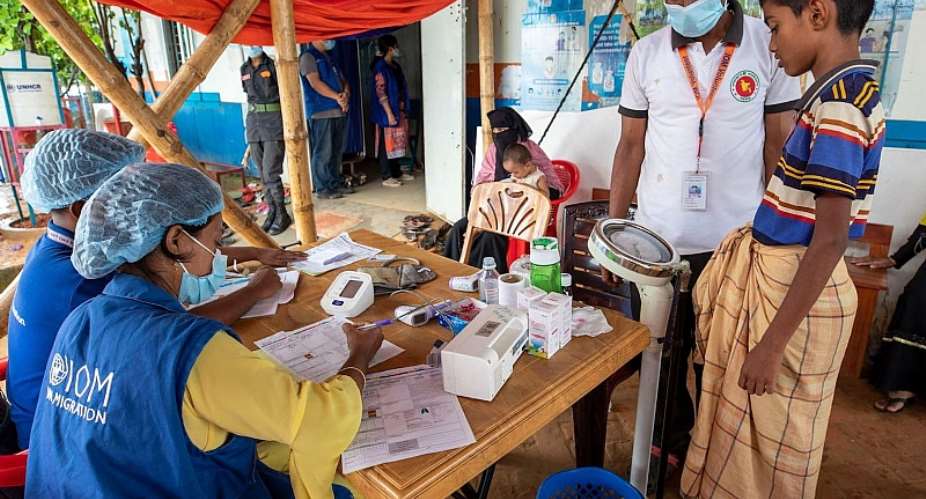Geneva/Cox’s Bazar – As the Rohingya refugee response enters the sixth year in 2023, the International Organization for Migration (IOM) is appealing for USD 125 million to support 1.4 million Rohingya refugees and host communities in need in Bangladesh’s Cox’s Bazar District.
Since the influx in 2017, over 900,000 Rohingya refugees have sought temporary refuge in Cox’s Bazar, where the Government of Bangladesh and the international community have provided humanitarian assistance from the onset.
The needs of these refugees are immense and meeting them is completely dependent on continued support until the Rohingya can voluntarily return to Myanmar in a safe and dignified manner.
IOM along with other humanitarian actors has been providing life-saving protection and assistance services to the refugee community for over six years. For 2023, the overarching priorities of IOM remain the protection needs of the Rohingya, and the provision of quality services across all sectors including Site Management and Site Development, Shelter, Water Sanitation and Hygiene, Health and Disaster Risk Reduction.
“The ongoing crises and disasters around the world should not make us forget the needs of Rohingya refugees and the response in Bangladesh,” said António Vitorino, IOM Director General. “We earnestly urge the international community to step up their efforts to ensure the Rohingya refugees continue to receive the support they need.”
IOM’s appeal is part of the Joint Response Plan (JRP) for the Rohingya Humanitarian Crisis, including over 100 response actors comprising UN agencies and NGOs. These humanitarian actors are collectively seeking to raise more than USD 876 million through the JRP, launched on 7 March 2023 with the Government of Bangladesh.
Protection for the refugees is a priority for IOM. To protect the most vulnerable – especially women and children who account for over 75 per cent of the population – IOM works with vulnerable individuals and at the community level to mitigate the risks of gender-based violence and the physical, psychosocial, and social vulnerabilities of child and human trafficking.
Every month, IOM supports delivering alternative sources of fuel to more than 96,000 households for cooking, contributing to food security while reducing the environmental impact. Since bamboo is the most widely used material in the camps, the IOM-run Bamboo Treatment Facility – the largest of its kind – has processed over 840,000 bamboo poles. Treating bamboo poles lengthens the bamboo’s lifespan, thereby helping minimize pressure on forests and ensuring cost efficiency.
Health care is another major area of focus. Additional funding will enable IOM to maintain its network of community health workers, along with the 45 primary and secondary health-care centres that it supports. Together these centres provide over 100,000 medical consultations per month.
Basic health is also dependent on access to clean water and sanitation. IOM is providing access to latrines and clean water, reaching almost 300,000 people daily. This includes running the largest solar-powered water treatment and distribution facilities in a humanitarian setting and wastewater treatment and solid waste management.
“Our priorities for 2023 include the continuation of providing life-saving assistance and protection of the Rohingya refugees and support for vulnerable host community members,” said Abdusattor Esoev, IOM Bangladesh Chief of Mission.
Just two days ago, a fire tragically broke out in the camps in Cox’s Bazar, destroying around 2,000 shelters and several facilities, leaving approximately 16,000 refugees without shelter. Thankfully, no casualties were reported.
“We call on the international community to contribute generously to our efforts to help these refugees and not forget the plight of the Rohingya in Bangladesh,” he added.





 Tuesday’s downpour destroys ceiling of Circuit Court '8' in Accra
Tuesday’s downpour destroys ceiling of Circuit Court '8' in Accra
 SOEs shouldn't compromise on ethical standards, accountability – Akufo-Addo
SOEs shouldn't compromise on ethical standards, accountability – Akufo-Addo
 Father of 2-year-old boy attacked by dog appeals for financial support
Father of 2-year-old boy attacked by dog appeals for financial support
 Jubilee House National Security Operative allegedly swindles businessman over sa...
Jubilee House National Security Operative allegedly swindles businessman over sa...
 Nobody can order dumsor timetable except Energy Minister – Osafo-Maafo
Nobody can order dumsor timetable except Energy Minister – Osafo-Maafo
 Mahama wishes National Chief Imam as he clock 105 years today
Mahama wishes National Chief Imam as he clock 105 years today
 J.B.Danquah Adu’s murder trial: Case adjourned to April 29
J.B.Danquah Adu’s murder trial: Case adjourned to April 29
 High Court issues arrest warrant for former MASLOC Boss
High Court issues arrest warrant for former MASLOC Boss
 Align academic curriculum with industry needs — Stanbic Bank Ghana CEO advocates
Align academic curriculum with industry needs — Stanbic Bank Ghana CEO advocates
 Election 2024: We'll declare the results and let Ghanaians know we've won - Manh...
Election 2024: We'll declare the results and let Ghanaians know we've won - Manh...
